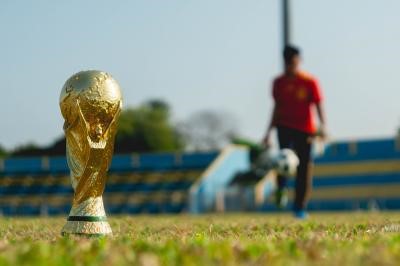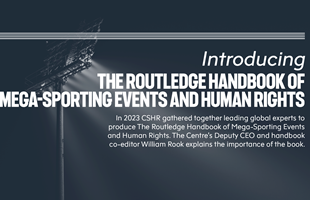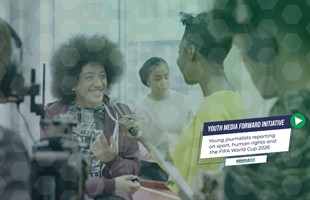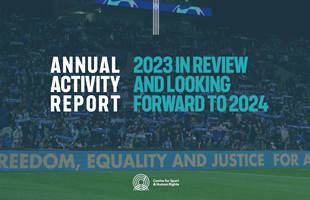Advancing the Human Rights Agenda in the lead up to the 2026 World Cup
10 Mar 2020

The 2026 FIFA Men’s World Cup is one of the first mega-sporting events (MSEs) to include extensive human rights elements in its bidding requirements and process. The winning bid, United 2026 from Canada, Mexico and the United States of America, proposed an extensive human rights strategy, which among other aspects, introduces a new human rights Scorecard. The Scorecard aims to assess candidate host city human rights preparedness and will provide a baseline from which cities can engage stakeholders in addressing risks identified. The Scorecard and its use are key human rights legacy elements of the event.
While FIFA and the three Member Associations are setting up operations for the 2026 World Cup, several civil society organizations have been developing recommended metrics for FIFA to include in the Scorecard. In consultation with stakeholders, the Centre for Sport and Human Rights (CSHR) is proposing metrics related to child rights, including child protection, safeguarding and participation. Other organizations and research institutions, including Human Rights Watch, Georgetown Law, and AFL-CIO are working in parallel to address other groups of rights holders and other categories of rights.
As part of efforts to support FIFA in advancing the human rights agenda throughout its operations, CSHR convened two consultations in February - one on the overall framework for the Scorecard and one specifically on the development of child rights indicators.
The first event, hosted by Georgetown Law in Washington, DC, assessed the current status of the overall process, outlined a workplan for further development of the Scorecard and agreed on specific asks to FIFA. Participants included partners with interest and expertise in the development and implementation of tools to measure respect for human rights across a range of issues and environments. Partner organizations including the Human Rights Campaign, known for the Municipal Equality Index, along with other key partners actively engaged in the Scorecard process, took part in the consultation and proposed next steps. FIFA, as owners of the host city selection process and Scorecard, now have the responsibility to take the critical steps needed to ensure implementation.
The second consultation was hosted by the Office of the UN Special Representative on Violence Against Children in New York City. The Centre has been developing indicators specific to children and their families since November 2019. Through this process, CSHR conducted 25 interviews with various experts and the consultation with the Special Representative’s Office was an important next step. The discussion in New York was an opportunity for CSHR to consult with child protection/rights and sport experts on which indicators should be recommended to FIFA for inclusion in the Scorecard on issues including eviction and displacement, child labor, sexual exploitations and other forms of violence.
While the Scorecard will initially be used for the 2026 FIFA Men’s World Cup, it is anticipated that it will become the standard for other FIFA events such as the Women’s World Cup as well as the Under 20 and Under 17 Men’s and Women’s World Cups, to name a few. CSHR is committed to engaging other sport federations and leagues in adopting similar approaches in their host selection processes. This work is critical to our mission of mobilizing sport organizations and their governing bodies alongside athletes, unions, employers, civil society organizations, UN agencies, sponsors, governments, inter-governmental organizations and broadcasters towards embedding human rights and child rights across the life cycles of sporting events, from vision to legacy.
Additional Resources
- 2026 FIFA Men’s World Cup: http://united2026.com
- United 2026 Bid Document: https://img.fifa.com/image/upload/w3yjeu7dadt5erw26wmu.pdf
- United 2026 Human Rights Strategy: https://resources.fifa.com/image/upload/proposal-for-a-united-human-rights-strategy-united-2026-bid.pdf?cloudid=s2xnrvfjg9kp0zelhxnt
- United 2026 Independent Report: Human rights in Canada, Mexico and the USA in the context of a potential FIFA 2026 World Cup competition https://resources.fifa.com/image/upload/independent-human-rights-assessment-united-2026-bid.pdf?cloudid=ywklipdfwenjx8kwfunj
- Video Clip of Mary Harvey and Prof Robert Stumberg following the Consultation: https://youtu.be/-wTY5Yh9s-w



